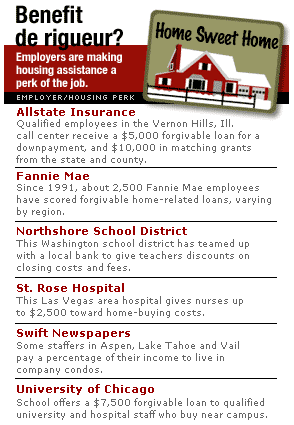BEND, Ore. (CNN/Money) - Rosy news about the job market notwithstanding, few employees are counting on hefty raises, big bonuses or stock option awards any time soon.
But, depending on where you live and what you do for a living, you may be privy to a new perk of the job -- housing.
An increasing number of employers are offering subsidized rent, forgivable loans and mortgage deals to employees looking to ditch their marathon commutes and live closer to work.

"Employers are starting to recognize that a shortage of affordable housing affects their bottom line," said Beth Marcus, director in Fannie Mae's community lending center, which has helped about 600 employers launch housing programs and expects at least another 400 employers to roll out similar programs over the next six years.
Indeed, even with historically low interest rates in their favor, homebuyers in many parts of the country have been priced out of the market.
In San Francisco and Boston, for example, median home prices are now $574,000 and $407,000, respectively, according to the National Association of Realtors.
This creates a dilemma for employers hoping to recruit new talent to their high-priced communities. Job candidates, who are loath to downsize their living arrangements, either head for the door after seeing home prices in the area. Or, they accept the job and head for the hills -- commuting to and from more affordable areas.
But long commutes can take a toll on employees, say experts. Not only are workers more likely to miss work and suffer from on-the-job stress, they're more apt to eventually leave the job.
"If we have teachers working in our district but living an hour away that is really inconvenient," said Pamela Steele, communications director for the Northshore School District, which is north of Seattle. Two years ago, the district teamed up with Home Street Bank to give teachers discounts on mortgage origination fees and closing costs if they buy a home in the area.
The payoff: "Shorter commute times ease the strain of after-school activities and give teachers an investment in the well-being of the community," said Steele.
Some strings attached
The most common type of housing assistance, according to Fannie Mae's Marcus, are forgivable loans to be used toward down payments or closing costs. As long as employees stay with the company for a specified period of time, they don't have to pay back the loan. (Since 1991, Fannie Mae has given 2,500 of its employees such loans.)
Allstate Insurance, for example, recently launched a pilot program in which employees buying a house within 15 minutes of one of its Illinois call centers qualify for a forgivable loan of $5,000 as well as matching grants from the state and the county worth an additional $10,000. Employees have to stay five years or pay back the loan at a prorated amount.
Over the past year, St. Rose Dominican Hospital near Las Vegas has helped more than 40 of its hospital staffers buy a home with a $2,500 forgivable loan. The hospital, which also provides employees with reduced rent at three nearby apartment buildings, requires that recipients stay at least three years or pay back a portion of the loan.
| More on Your Home
|

|
|
|
|
"The employee stays and the company saves money over time," said Samantha DeKoven, housing associate with the Metropolitan Planning Council in Chicago, which estimates that for every $50,000 a company gives in down payment assistance, it recoups $100,000 in turnover costs.
Since 2000, the council has recruited 22 employers in the Chicago area � among them Allstate, Bank One and the University of Chicago � to set up housing assistance programs. "Interest in employer housing assistance has grown exponentially," DeKoven added.
Cheap rent is another popular housing perk.
In 2002, the Santa Clara Unified School District built a 40-unit apartment complex for its teachers, who pay about half the going rent for the area at "Casa del Maestro" (Yes, that's Spanish for teacher's house.)
In Aspen, Lake Tahoe and Vail, some employees of Swift Newspapers, which publishes newspapers in these pricey towns, have the option of renting company-owned condos and apartments at a discount.
"Because we publish community newspapers we want our people to live in those communities," said the company's director of human resources, Debbie Spieker-Martin. She is, however, quick to point out that while the locations may seem glamorous, the accommodations are not.

|